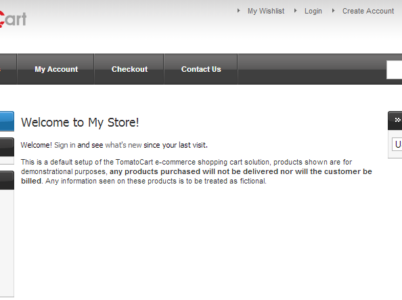AShop is a cutting-edge payment processor software specialising in providing businesses with a comprehensive eCommerce platform. It offers various tools and features to help merchants establish and manage their online stores effectively. AShop is available to simplify the complexities of eCommerce and empower businesses to succeed in the competitive digital marketplace.

- TomatoCart customization and theme development : TomatoCart offers a range of customizable templates that allow businesses to create a unique look and feel for their online store.
- TomatoCart multilingual and multicurrency support: : TomatoCart supports multiple languages and currencies, making it a good choice for businesses that operate in multiple countries.
- TomatoCart payment gateway integration for secure transactions: TomatoCart integrates with a range of payment gateways, including PayPal, Stripe, and Authorize.net.
- TomatoCart SEO optimization for higher search ranking: TomatoCart has built-in SEO optimization features that allow businesses to improve their search engine rankings.
- Marketing and promotion tools: TomatoCart includes a range of marketing and promotion tools, including coupon codes, discounts, and email marketing.
- Magento: Magento is a feature-rich, open-source eCommerce platform that is highly customizable and scalable. It is known for its robust catalog management, advanced SEO capabilities, and support for large-scale eCommerce stores.
- WooCommerce: WooCommerce is a popular eCommerce plugin for WordPress that allows businesses to easily set up and manage an online store. It is known for its user-friendly interface, flexibility, and support for a wide range of payment gateways and shipping options.
- Shopify: Shopify is a cloud-based eCommerce platform that is known for its ease of use and powerful features. It offers a range of tools for building and customizing an online store, as well as built-in support for payments, shipping, and inventory management.
- OpenCart: OpenCart is an open-source eCommerce platform that is known for its ease of use and flexibility. It offers a range of features for managing products, orders, and customers, as well as support for a wide range of payment gateways and shipping options.
- BigCommerce: BigCommerce is a cloud-based eCommerce platform that is known for its scalability and advanced features. It offers a range of tools for building and customizing an online store, as well as support for payments, shipping, and inventory management.
TomatoCart’s multilingual and multicurrency support makes it a good option for businesses that operate in multiple countries or that want to expand their customer base globally. It is also suitable for businesses that want to improve their search engine rankings, as TomatoCart has built-in SEO optimization features.
However, TomatoCart may not be the best option for businesses that require more advanced eCommerce features or integrations, as it may not offer the same level of functionality as some of its competitors. Businesses with complex eCommerce requirements may need to consider a more advanced platform.
Web hosting: Businesses will need to host their TomatoCart store on a web server. Web hosting costs can vary depending on the hosting provider and the hosting plan.
Domain registration: Businesses will need to register a domain name for their TomatoCart store. Domain registration fees can vary depending on the domain registrar and the domain extension.
Payment gateway fees: If businesses want to accept credit card payments on their TomatoCart store, they will need to integrate with a payment gateway. Payment gateway fees can vary depending on the provider and the transaction volume.
Customization and development: Businesses may need to hire a developer to customize their TomatoCart store or add additional features. The cost of customization and development will depend on the scope of the project and the hourly rate of the developer.
TomatoCart provides a range of order management and fulfillment features that make it easy for businesses to manage their online orders efficiently. Here are some of the key features of TomatoCart’s order management system:
Order management: TomatoCart allows businesses to manage their orders from a centralized dashboard. Businesses can view their orders, update order statuses, and manage customer information.
Inventory management: TomatoCart’s inventory management system allows businesses to keep track of their stock levels and ensure that they have enough inventory to fulfill orders.
Shipping management: TomatoCart provides businesses with a range of shipping options, including real-time shipping rates and shipping label printing.
Returns management: TomatoCart’s returns management system makes it easy for businesses to handle returns and refunds.
TomatoCart plugin and module integration:
TomatoCart is an open-source eCommerce platform that supports a wide range of plugin and module integrations. This makes it easy for businesses to extend the functionality of their online store and add new features as their business grows.
TomatoCart supports a range of third-party integrations, including payment gateways, shipping providers, social media platforms, and more. Some popular integrations include PayPal, Stripe, FedEx, UPS, Facebook, and Google Analytics.
TomatoCart also has its marketplace of plugins and modules, which allows businesses to browse and install add-ons directly from within their TomatoCart dashboard. These plugins and modules can help businesses add new features to their website, such as advanced product filtering, upselling and cross-selling, and more.
TomatoCart B2B e-commerce solutions for wholesale businesses:
TomatoCart provides a range of B2B eCommerce solutions that are specifically designed for wholesale businesses. Here are some of the key features of TomatoCart’s B2B eCommerce solution:
Custom pricing: TomatoCart allows businesses to set custom pricing for their wholesale customers, including bulk discounts and quantity-based pricing.
Advanced inventory management: TomatoCart’s inventory management system allows businesses to manage their inventory at a granular level, including tracking stock levels by warehouse or location.

TomatoCart is an open-source eCommerce platform that originated in 2008. It is built upon the Zen Cart platform but has undergone significant modifications to offer enhanced features and functionality. Known for its user-friendly interface and customization capabilities, TomatoCart is widely adopted by small to medium-sized businesses.
- Magento: Magento is a highly customizable and scalable eCommerce platform that is suitable for large-scale online stores. While Magento offers a wider range of features and advanced customization options compared to TomatoCart, it may require more technical expertise to set up and manage.
- WooCommerce: WooCommerce is a popular eCommerce plugin for WordPress that is easy to use and offers a range of customization options. Compared to TomatoCart, WooCommerce may be more suitable for smaller online stores and businesses that already have a WordPress website.
- Shopify: Shopify is a cloud-based eCommerce platform that is known for its ease of use and powerful features. While Shopify may offer more built-in features and integrations compared to TomatoCart, it can also be more expensive.
- OpenCart: OpenCart is an open-source eCommerce platform that is known for its ease of use and flexibility. Compared to TomatoCart, OpenCart offers a more user-friendly interface and a wider range of built-in features, but may not be as customizable.
- BigCommerce: BigCommerce is a cloud-based eCommerce platform that is known for its scalability and advanced features. While BigCommerce may offer more built-in features and integrations compared to TomatoCart, it can also be more expensive.
Overall, the best eCommerce platform for a business will depend on its specific needs, budget, and technical expertise. While TomatoCart may offer a good range of features and customizability, businesses should also consider other alternatives and evaluate them based on their specific requirements.
Zen Cart is an open-source e-commerce platform that enables users to create online stores with ease. It offers an extensive range of features, including product management, order management, shipping and payment integration, and customer management. Zen Cart is highly customizable and can be tailored to fit the specific needs of a business. It provides a user-friendly interface, making it accessible even for those with little or no experience in web development.
Zepo is an e-commerce platform designed to assist small businesses in India in establishing and operating their online stores. Founded in 2011, Zepo offers a variety of features and services to support businesses in selling their products online. These include website design and development, payment gateway integration, inventory management, and marketing tools.






